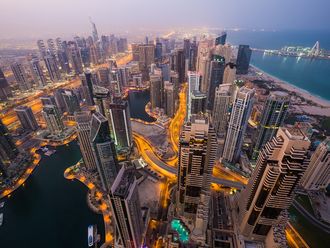Framed by the three-pronged credo fostering sustainability, mobility, and opportunity, Dubai had clearly placed green principles firmly at the heart of its bid to host the World Expo 2020. For the first time in Expo history, quantifiable sustainability targets will have been set, along with global benchmarks on resource management for events on a massive scale.
Careful coordination and administration of the post-event scenario isn’t enough for managing the sheer volume of resources that an event of this scale can consume and generate. Private and public sector stakeholders in Dubai will need to band together from the outset in planning for the before, during, and post-event scenarios well ahead of Expo 2020.
This would require integration and collaboration from the outset, where environment solutions companies can work together with suppliers, exhibitors and event managers to combat the problem at the source, perhaps entering into an agreement to only have recyclable products on site — from polystyrene cups at food outlets, to packaging materials at the pavilions.
Standardising materials
By standardising the materials available at the venue, we could avoid a scenario where non-recyclable materials accidentally mix in with recyclables. For example, if a PVC cup were to fall into a recycle bin, the chloride from the PVC cup would completely contaminate the collected recyclables and render it useless — sending it straight to a landfill.
This is what we are trying to avoid by proposing a stakeholder agreement from the design stage. By including waste companies in the conversation as early as when the venue is designed, we can incorporate solutions before the infrastructure is built, instead of dealing with the end-of-pipe problems.
The biggest danger in waste management is the mixing of wet waste with dry recyclables. At mega-events, if the suppliers are mandated to provide recyclable materials on site across the board, the resources won’t need to be segregated or sent to the landfill.
We would be looking at a scenario where all collected resources are dry, untainted recyclables which can be repurposed. Food waste can be processed using anaerobic digestion, where micro-organisms break down biodegradable waste, producing energy — which could even be used at the venue. Having a dedicated onsite facility might speed up the process, while adding to the emirate’s existing waste management infrastructure.
Campaign to promote recycling
Dubai’s win of Expo 2020 could translate to a lot of positive change for not just the city, but for the Gulf at large. In the run-up to the event, the city could benefit from an intensive awareness campaign to promote recycling, supported by the necessary infrastructure.
Once residents have a healthy, long-term attitude towards waste segregation, visitors will pick up on that, and will be more likely to steer away from excessive consumption, refrain from littering and recycle when need be. The event’s waste management strategy alone, if planned and executed seamlessly, is enough to catalyse change in waste management practices within the region.
By engaging all the stakeholders involved in the planning, logistics and execution of the event as early as at the bidding stage, Expo 2020 can limit its own contribution to landfill, while creating world-class standards to which other mega-events, projects and even cities can aspire.
— The writer is the CEO of averda, the waste management consultancy.











